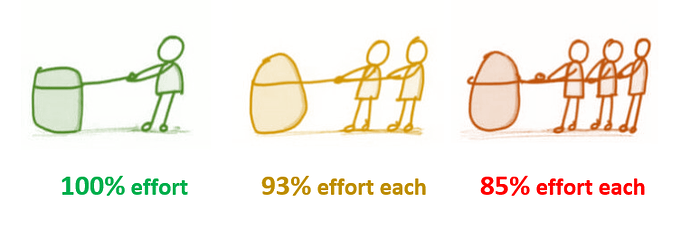There is a theory that emerged in 1913 which supports that the quality of the product decreases as the size of the group increases. This is called” The Ringelmann Effect”. This concept was discovered by a French agricultural engineer named Max Ringelmann. He found that though groups outperform individuals, groups usually do not perform to the extent that they could if each individual was working at maximum capacity. He tested this through a tug-of-war experiment. There, he changed the number of people pulling the rope. He observed that individually, people applied greater force to the rope. On the other hand, the force decreased when the number of people increased which proved social loafing. He also acknowledged that individuals start to lose their motivation when more people share the responsibility of a task.
The Ringelmann effect doesn’t solely occur in tug-of-war. For instance, think that you are a member of a team, and you receive an email. You might think that someone else can respond to it. But what if every member thinks the same way? Also, people feel pressure on themselves mostly because they are concerned to be evaluated by others. On the contrary, when they work individually, they don’t have anxiety about being estimated. So, the thing they do in a crowded group is to stay in the background and be anonymous. As a result of these, we see a decrement in the participation and contribution rate in a group. If we reduce the size of the group, every member will undertake a more significant role. When the members perceive that they’re indispensable and play a great role in the team, it will push them to work harder and strive more. So, they won’t obtain the opportunity to loaf.
There is also a proverb that is” If we don’t all row, the boat won’t go”. This proverb is opposing the existence of the Ringelmann effect. It supports cooperativity and collaboration. It advocates that if there are more people, the task will finish faster and more successfully.
Some quotes prove this proverb’s accuracy. For example, Henry Ford, who was an American industrialist said, “Coming together is a beginning, staying together is progress, and working together is success.”
I have noticed, however, that the Ringelmann effect has a greater impact on our daily lives. Individuals will contribute more if there are fewer people in a group. In contrast, someone in a group with around 70 members might think that if he/she does not participate there will be no consequences. This is not unusual, since many individuals lose motivation and choose to loaf in large groups.
In a nutshell, there are many examples of the Ringelmann effect in our lives, and it’s because it’s related to human psychology. I admit that cooperation is important as the proverb says, but we, as humans, behave as Max Ringelmann’s research results suggest.
References:
https://blog.hubspot.com/marketing/teamwork-quotes


